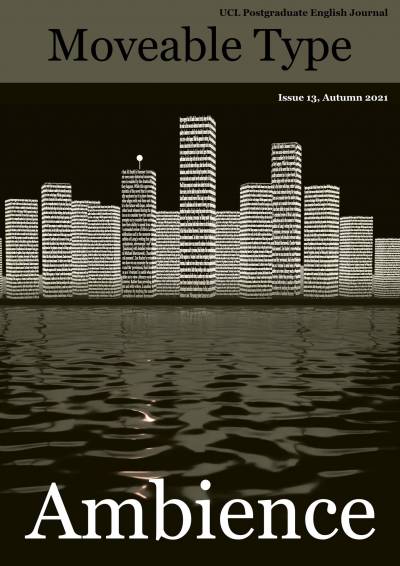2020-21: Ambience (Volume XIII)

Ambience, a feeling or mood evoked by an individual’s experience of a place at a set time, can frame our experiences of literary texts. As Virginia Woolf suggests, a reader’s immediate surroundings can frame their reading of a literary text when, for instance, light falls ‘over shoulder’ and onto ‘the page’ (57). Developing Woolf’s sentiment in Literary Translation and The Rediscovery of Reading (2012), Clive Scott adds, ‘The world outside [Woolf’s] window becomes the atmospheric envelope of the reading experience, and, in return, is […] transformed and absorbed by the book’ (57).
Both Woolf and Scott remind us that the reading experience is not only place-based but also temporally based: the light falling across Woolf’s page is transient while Scott’s evocation of an atmospheric envelope connotes letters with postal stamps that are sent through time but have their origins rooted in a particular moment or series of moments. For both Scott and Woolf, ‘there is no doubt that the act of reading in time requires a corresponding act of reading in place, and the relationship between the two acts is inextricable’ (151). Nevertheless, the ambience of a literary text need not only be prescribed by the world outside of the text but can also be shaped by texts themselves which can immerse the reader in a world apart from theirs.
Exploring whether these two experiences of literary ambience can be separated, this issue of Moveable Type analyses moments in which the world outside the text becomes the text and those moments in which a text provides readers with an ambient experience that exceeds the world around them in some way. It contends that neither of these ambient experiences can exist in the absence of the other; there will inevitably be contact points as one brushes against the other, demonstrating how thin the veil is that hangs between them. Even in texts and literary experiences that encourage readers to suspend their disbelief, there will be moments that will drop readers back into their embodied reality. These moments, which may be engineered by the text or sporadically imposed on unsuspecting readers by the world around them, illustrate how world and text are always in negotiation with one another.
Editorial Introduction
Sarah Edwards, Sarah Chambré, Will Fleming and Miriam Helmers - Ambience: An Introduction
Journal Articles
Seb Rolley - Ambience and the Symbiotic Real: An Ecocritical Reading of It Must Have Been Dark By Then
Miriam Helmers - Ambient Literature as an Act of Faith in the York Medieval Mystery Cycle
Laura Day - Lost Aural Landscapes in ‘Hard of Hearing’
Maria Sledmere - I, Cloud: Staging Atmospheric Imaginaries in Anthropocene Lyric
Catherine Dent - The Ties that Bind: Virginia Woolf, Leslie Stephen and Ancestral Mountains
Creative Submissions
Elisa Sabbadin - Being Home
K.V.K. Kvas - Alien Investigations of Octopus Philosophies
David Prescott-Steed - Grave Reading
Scott Stevens - Crystal Springs Reservoir
Rowland Bagnall - A Vast Hour: After Genevieve Taggard
Reviews
Chunlin Men - The Ambitions and Anxieties of Ambience
Sadie Barker - Static, Glitch, Lull: Don DeLillo’s The Silence
Flora Sagers - Time on Our Hands in Ali Smith’s Summer
Rhonda Mayne - Zadie Smith’s Intimations: The Idea of the Ambient Essay
Urvi Shah - Ambient Literature: Textuality and Narratology
Sarah Chambré - Re-viewing and Reparations in Olivia Laing’s Funny Weather
Zoe Rucker - Ambient Avant-Gardes in Sophie Seita’s Provisional Avant-Gardes
Moveable Type Podcast: Ambience (Episode 1)
Moveable Type is a new podcast series and an aural counterpart to the Moveable Type Journal. The podcast showcases the work of UCL’s English Department, and invites students, academics, and writers to enter a conversation with one another to reflect on literary issues.
This first episode celebrates the launch of Ambience, the 2021 issue of Moveable Type. It includes an interview with the journal’s editorial team, a thirty-second book review by Sadie Barker, and readings by Elisa Sabbadin, David Prescott-Steed and K.V.K. Kvas.
The Moveable Type team in conversation in this episode are Sarah Chambré, Sarah Edwards, Will Fleming, Miriam Helmers, and Zoe Rucker. The interview was conducted by William Burns and Damian Walsh.
Listen to the full version of Episode 1 here. It is also available on Soundcloud, Spotify and Apple Podcasts.
Access the transcript for Episode 1 here.
 Close
Close

